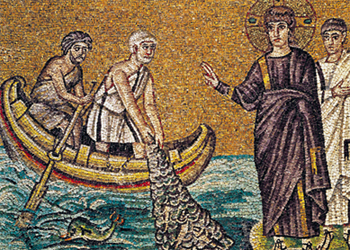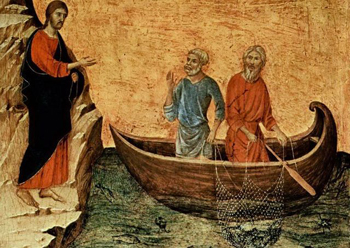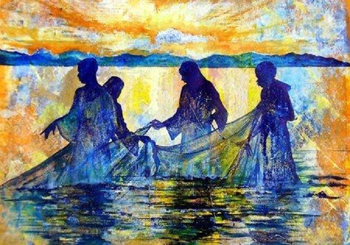For Sunday January 26, 2020
Lectionary Readings (Revised Common Lectionary, Year A)
Isaiah 9:1-4
Psalm 27:1, 4-9
1 Corinthians 1:10-18
Matthew 4:12-23
When I was eleven years old, my childhood church held a series of “revival” meetings for children. Every evening for a week, I listened from the front pew as an enthusiastic guest preacher invited me and my Sunday School classmates to dedicate our “whole” hearts, lives, dreams, and futures to God. In no uncertain terms, he told us that God wanted us to “give up everything for the One who gave up everything for us,” and to use our talents and treasures — not to further our own interests — but to spread Christ’s message of love and salvation to the world.
I remember feeling exhilarated as I sat in church that week, imagining the radical, sold-out-for-Jesus life the preacher described. But I also remember feeling apprehensive and disoriented. Whether or not the minister intended it, what I took away from his sermons was that I couldn’t serve Jesus properly unless I became someone fundamentally different from who I was. My bookish shyness and introversion would have to give way to voluble charisma and flair. I’d have to say goodbye to the United States, and head to some far flung corner of the world I’d never heard of. I’d have to become a pro at face-to-face and door-to-door evangelism. I’d have to surrender my dreams of writing, and Become Useful.
In the version of discipleship I conjured up as a kid, my value in God’s kingdom existed in inverse proportion to my innate loves, interests, desires, and hopes. The only authentic way to follow Jesus was to somehow become not me.
In our Gospel reading this week, Jesus approaches two sets of fishermen by the Sea of Galilee, and says to them, “Follow me, and I will make you fish for people.” Immediately, Matthew’s Gospel tells us, the men left their boats and followed Jesus.
 |
I’ll be honest; I don’t enjoy fishing. When I was a little girl, my father would take me along on occasional fishing trips, and I would invariably ruin them with my squeamishness: “Isn’t that hook hurting the worm? Won’t the fish’s mouth get cut by the hook? Why are you letting that poor fish gasp in the bucket? It’s still alive!”
Hard as I tried to enjoy the sunlight on the water, the cool ocean breeze, the satisfaction of a good catch, I couldn’t get over what I saw as the essential violence at the heart of fishing: a living creature offered up as bait. Another living creature torn by a sharp hook, or hauled out of its native element with a net, and left to die for lack of air. Eventually, my dad took the hint, and my younger brother — who loves fishing to this day — took over as his seafaring companion.
All of that to say, I don’t easily connect to Jesus’s invitation to “fish for people.” Something about the metaphor makes me squirm.
It doesn’t help that when I first learned the story of Jesus calling his disciples, it was framed as evangelistic in a very particular sense. The fish represented lost souls, doomed to hellfire. “Hooking” them for Jesus — getting them to church, to youth group, to the altar; leading them to say the sinner’s prayer and accept Jesus as their personal Savior; insisting that only our version of Christianity held "The Truth" which would save them from damnation — was the only hope the poor fish had.
So. Was I ready (as that revival preacher told my eleven-year-old self) to give up everything, leave all I know and love, and follow Jesus? Was I willing to fish for lost souls? Or would I cling to my worldly boats and nets, ignore Jesus’s call, and let countless sinners die without salvation?
Gospel stories are challenging to grasp even at the best of times, but years of baggage like mine can make the task even harder. But what strikes me now as I think about Jesus calling Simon, Andrew, James, and John into lives of discipleship, is how familiar and close-to-home his call actually was. Jesus did not invite them to abandon who they were; he invited them to become their most authentic, God-ordained selves. He invited them to live into the fullness of the Imago Dei they were born with.
 |
By which I mean: Jesus’s invitation to his first disciples was specific and particular, rooted in the language, culture, and vocation they knew best. What metaphor would make more sense to four fishermen than the metaphor of fishing for people? Simon and Andrew would have understood the nuances of that metaphor in ways I never will. James and John knew from years of hard won experience what depths of patience, resilience, intuition, and artistry professional fishing require. These men knew the tools of the trade, the limitations of their bodies and the potential dangers those limitations posed, and the life-and-death importance of timing, humility, and discretion.
Most of all, they knew the water. They knew how to respect it, how to listen to it, and how to bring forth its best in due time. When Jesus called these tried-and-true fishermen to follow him, they understood the call not a directive to leave their experience and intelligence behind, but to bring the best of their core selves forward — to become even more fully and freely themselves.
In other words, I don’t believe anymore that I’m meant to follow Jesus into a self-annihilating abstract. We’re not supposed to heed his call “in general,” as if Christianity comes in a number of pre-packaged, cookie-cutter shapes we have to pummel ourselves into. If we’re going to follow him at all, we’ll have to do it in the unique particulars of the lives, communities, cultures, families, and vocations we find ourselves in. We’ll have to trust that God prizes our intellects, our memories, our backgrounds, our educations, our skills, and that he will multiply, shape, and bring to fruition everything we offer up to him in faith from the daily stuff of our lives. “I will make you,” he tells the fishermen. I will take cultivate, deepen, magnify, purify, protect, and perfect the people God created you to be.
I don't mean to suggest that discipleship won't require sacrifice, or change, or risk. It will. But I am convinced these days that God is gentler with us than we are with ourselves. The spiritual transformations that have had the most traction and power in my life have been the ones that also feel the most organic, the most ordinary, the most close-to-home. Surrender to Jesus isn’t only about renunciation. It’s about resurrection. It’s about abundant and authentic life. When Jesus promises to “make us,” it’s a commitment to nurture us, not a threat to sever us from all we love. It's a promise rooted in gentleness and respect — not violence and coercion. It's a promise that when we dare to let go, the things we relinquish might be returned to us anew, enlivened in ways we couldn't have imagined on our own.
Most importantly, it is a promise from God to us — not from us to God. As Barbara Brown Taylor so aptly puts it, the story of this Gospel is a miracle story. Jesus calls, and the four fishermen “immediately” follow. No hesitation, no questions asked. Is this because they’re men of superhuman courage or prophetic foreknowledge? Of course not. These are the same guys who later in the Gospels doubt, deny, and abandon Jesus. They’re as fallible and as ordinary as the rest of us, and their own volition can’t get them very far.
 |
No, they immediately follow Jesus because Jesus makes it possible for them to do so. “This is not a story about us,” Taylor writes. “It is a story about God, and about God’s ability not only to call us but also to create us as people who are able to follow — able to follow because we cannot take our eyes off the one who calls us, because he interests us more than anything else in our lives, because he seems to know what we hunger for and because he seems to be food.”
What bothered me as a child — and bothers me still — about the fishing metaphor is that we so easily misinterpret it to mean that we have the power to “hook” or to “catch” others for God. We don’t. We are not called to cajole, manipulate, trap, bully, or even persuade others to “accept” Jesus, or join our religion. It is God alone who captures the imagination. God alone who makes the vision of his kingdom come alive in a human soul. All we can do is embody the vision in the particulars of our lives, reflecting into the water the profound beauty of who Christ is. The rest is up to God.
In the end, Jesus’s invitation is Gospel, or “good news.” If it’s not good news, it’s not God. If it’s not good news for all — it’s not God. Evangelism becomes abusive when we twist it for our own convenience, severing it from its social, economic, and cultural context in order to institutionalize and idolize what is not God. It becomes abusive when we focus on numbers, formulas, and glossy success stories, forgetting that Jesus came to call people. “Fish for people.” People who are caught in the nets of exploitation, corruption, poverty, war, exile, homelessness, violence, disease, climate change, racism, sexism, homophobia… the list goes on and on and on. What would count as Good News for them?
The four men “immediately” left their nets and followed Jesus. In time, they made the Gospel their own, sharing its radical power through the details of their own lives and stories. What is the Gospel according to you? What is your Good News, and how will you share it in the turbulent waters of your particular time and place?
“Follow me and I will make you.” Jesus is trustworthy. He will.
Debie Thomas: debie.thomas1@gmail.com
Image credits: (1) BibleOdyssey.org; (2) Orthodox Christian Network; and (3) DailyVirtue.net.





